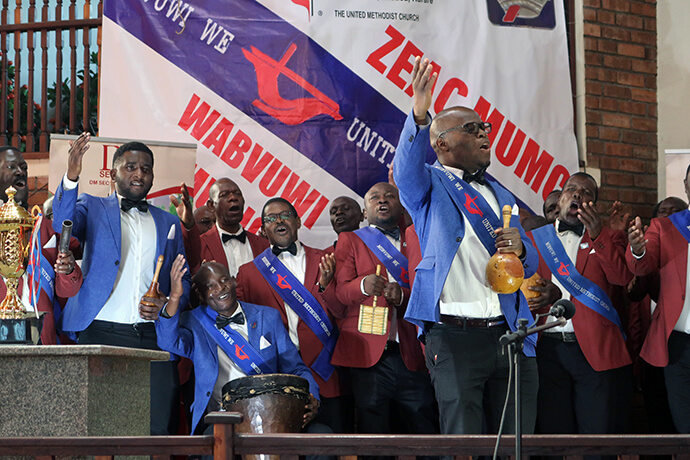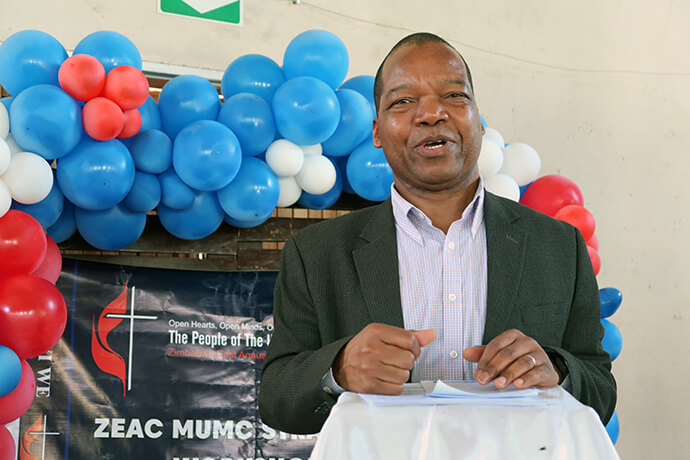Key points:
- Members of the Zimbabwe East Conference’s Mubvuwi we United Methodist Church are turning to income-generating projects for sustainability — to fund their own programs and support the church.
- Tapiwa Mupari, who chairs the men’s organization, stressed the importance of acquiring assets and engaging in capital projects for financial sustainability.
- The men’s organization initiative led to the signing of an agreement for a United Methodist Church funeral cash plan with a major banking and finance company.
- The new focus resonates with current conversations on the African continent regarding decolonizing the church.
The Zimbabwe East Conference men’s organization recently added business projects to its strategic plan for the current quadrennium.
Renowned globally for winning souls to Christ through spiritually uplifting music characterized by the trademark drums and rattles, members of Mubvuwi we United Methodist Church plan to venture into various income-generating projects to fund their programs and boost church finances.
Chair Tapiwa Mupari, who was elected last year, said it was important for the organization to acquire assets and start capital projects at conference, district and local church levels.
“The vision of the church,” he said, “is also the vision of the organization. We aim to claim higher ground physically, morally and numerically. We will focus on membership growth across the conference and embark on income projects like farming that will sustain the organization and the church while creating employment.”

In late January, an agreement was drafted between the church and ZB Financial Holdings, a major Zimbabwean banking and financial services company, to offer The United Methodist Church Cash Funeral Plan, a funeral-assurance product specifically tailored for church members.
The funeral coverage is an initiative of the men’s organization, and the memorandum was signed on March 20. A portion of the money raised by Mubvuwi we United Methodist Church will go to the church in Zimbabwe’s common pool to ensure all pastors receive the same salary from the episcopal area treasury, regardless of their place of appointment.
Bernard Mwashita, board of trustees associate chair for the Zimbabwe West Conference, congratulated the men’s organization for this achievement.
“Today marked another significant development between the two key partners, UMC and ZB Life Assurance Limited, through an investment initiative,” he said. Beneficiaries will include the church, its members and ZB itself.
The funeral plan has created employment for about 100 people who were recruited as marketing agents.
“Suffice to say, as the board of trustees, our interest is in increasing the church asset base through sweating its assets,” Mwashita said. “Human capital is the main driver of value creation. The MUMC initiative unlocks value for the church through this innovative funeral cash plan.”

The organization’s new focus resonates with current conversations on the African continent regarding decolonizing the church, a goal only achievable by financial sustainability. In Zimbabwe, the church’s mission centers own vast tracts of land for farming. Some areas are believed to be rich in gold and other mineral deposits, as well as professional human resources.
Addressing 60 Mubvuwi we United Methodist Church conference and district leaders, Zimbabwe East connectional ministries chair the Rev. Preston Majoni said the new leadership inspired him.
“The meeting,” he said, “is a testimony that our MUMC leaders are innovative in discharging their mandate. That they have pioneered this initiative is a clear sign that the leadership is in the right trajectory in making disciples of Jesus Christ for the transformation of the world. Such meetings will go a long way in transforming the organization and the future of The United Methodist Church in Zimbabwe.”
Among planned short-term projects are poultry farming and a piggery. Long-term ventures include forming strategic partnerships with major corporations, mining and establishing a private school.
Zimbabwe’s former central bank governor, John P. Mangudya, chairs the Common Market for East and Southern Africa central bank governors. He said the men’s organization, founded in 1918, needs to have a strong purpose and show its prowess in the corporate world.
“We need to do more,” he said. “Let’s complement our music with contributing more to society.” Citing business opportunities in Zimbabwe, Mangudya added, “We are too rich to be poor.”
Mangudya, a member of Chisipiti United Methodist Church, encouraged the men to be torchbearers of the church by producing new, viable programs.
“Let’s walk the talk,” he said. “We are the light of the world. Lost souls do not just want our music; they need food, shelter and clothing.”

The Rev. Sophirina Sign, Zimbabwe East connectional ministries director, commended the men for their vision for The United Methodist Church’s future.
“The strategy meeting (was) aimed at empowering MUMC leaders to understand their purpose of existence and (to) lead successful lives to impact their families, church and communities,” she said. “This is historic. It is the first time the men have organized such a meeting (that) transformed the mindset of each member who attended.”
Fungai Chihuri, Zimbabwe West Conference Mubvuwi we United Methodist Church chair, applauded his counterparts for the workshop and emphasized the importance of implementing the planned strategy.
“This is the dreaming stage,” he said. “It is pointing us where we want to go. It is no longer time for the men’s organization to report on small achievements. Let us take our position as leaders and do great and big things.”
Subscribe to our
e-newsletter
Men’s groups have started income-generating projects to fund activities and support local churches. These include Seke South Mubvuwi we United Methodist Church, which has operated a piggery project since April 2023.
According to Martin Kissie, the project is based at a member’s farm in Beatrice, about 12 miles from Chitungwiza. It started with six pigs loaned by two members. Today they have 48 pigs — five sows, one boar, 15 porkers and 27 piglets. The porkers will soon be sold to raise funds for the men’s programs.
United Methodist historian and Africa University archivist Shepherd K. Machuma said the planned school would be the third one that the men’s organization has established.
Nyadire Secondary School, begun as a school for boys in 1977, now enrolls both boys and girls and offers six years of secondary education. Zimbabwe East Conference men also founded the Clare Mission Secondary School in 2005, he said.
Eveline Chikwanah is a United Methodist News correspondent based in Harare, Zimbabwe.
News media contact: Julie Dwyer at newsdesk@umnews.org. To read more United Methodist news, subscribe to the free daily or weekly Digests.




